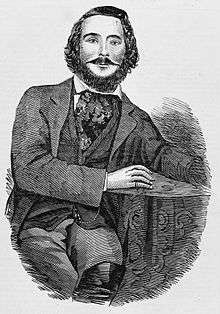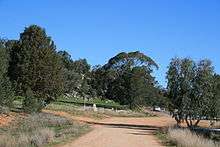Frank Gardiner
| Frank Gardiner | |
|---|---|
 Gardiner, 1864 | |
| Born |
1830 Scotland |
| Died |
c. 1903 Colorado, United States |
| Occupation | Bushranger |
Frank Gardiner (1830 – c. 1903?) was an Australian bushranger. Sources differ as to his origins. Some have him as a Currency Lad, native-born near Goulburn, New South Wales around 1830, [1] others that he was Scottish-born, and migrated to Australia as a child with his parents in 1834.[2][3] His real name was Francis Christie, though he often used one of several other aliases including Gardiner, Clarke or Christie. He supposedly took the name Gardiner after a man who lived for some years with his family and who had taught him how to ride and break in horses. He continued to use the surname Gardiner when he moved to the United States.
Appearance
Gardiner was 5 ft 9 inches tall with an athletic build, with his brown wavy hair and hazel eyes, he was attractive with a face of a corsair and a smooth voice.[1]
Early career
In 1850, Gardiner moved to Victoria and there with two accomplices stole 24 horses from William Morton's station in the Loddon Valley. They planned to sell the horses in Portland. Morton followed their tracks to Bilson's Inn, near Heyfield, where the trio were arrested. Gardiner was tried at Geelong on 22 October 1850 and sentenced to five years hard labour.[4][5]
On 20 March 1851, Gardiner was part of a work party working outside Pentridge Prison when they rushed the guards and escaped. Most of the convicts were rounded up within days but Gardiner escaped and returned to New South Wales. Teaming up with a youth named Prior, Gardiner resumed his horse stealing career. In February 1854 Gardiner (now calling himself Clarke) and Prior were caught trying to sell stolen horses at Yass. This time he was sentenced to fourteen years ( seven years for each charge). While imprisoned on Cockatoo Island he met the bushranger John Peisley.
Granted a ticket of leave in 1860 on the condition of staying in the Carcoar district, he soon joined Peisley, who was roaming as a lone highwayman. His ticket of leave was revoked and a warrant for his arrest for cattle stealing was issued. Briefly captured after a gunfight with two troopers at Fogg's hut near Reids Flat, Gardiner and Fogg managed to bribe one of the policemen to allow Gardiner to escape.[6]
Lachlan Gold Escort robbery


In June 1862 he bailed up the Lachlan Gold Escort near Eugowra with a gang including Ben Hall, Dan Charters and Johnny Gilbert. This hold up is considered to be one of the largest ever gold robberies in Australian history. The total value of the 2,700 ounces of gold and bank-notes taken was estimated at £14,000 (approximately A$12.5 million in 2012 terms). Much of the gold was recovered by mounted police after they surprised the gang on Wheoga Hill near Forbes. What happened to the remaining gold is still the subject of much speculation and rumour. Treasure hunters still visit the area and it is even rumoured that two Americans who were thought to be Gardiner's sons visited the Wheogo Station near the Weddins in 1912 claiming to be miners.[7][8]
Capture and exile
In 1863-1864, Gardiner was living with Ben Hall's sister-in-law Kitty Brown, at Apis Creek near Rockhampton, Queensland, where he was running a general store.[9] He was recognised and reported to the police in Sydney. Gardiner was apprehended in controversial circumstances by NSW police operating outside their jurisdiction. One of the NSW policemen used Gardiner's own horse 'Darkie' during the capture. He was taken back to Sydney, and sentenced to 32 years hard labour.
Gardiner served only 10 years of his sentence after successful appeals by his two sisters. He was granted an early release, conditional on his leaving the country. In late 1874, Gardiner arrived in California having travelled via Hong Kong. He is just one of many Australians exiled from this country during the bushranging era.
Gardiner owned the Twilight Star Saloon on Kearny Street in the Barbary Coast area of San Francisco. There are many rumours about his life there, including a claim that he married a rich American widow and had two sons. None have been proven. The circumstances of his death are not known with any degree of certainty, due in large part by the destruction caused during the 1906 San Francisco earthquake. There are various reports of his death ranging from 1882 (as reported in the Sydney Evening News) to 1904 as the Sydney Morning Herald reported that year.[3][10] Again, there is no hard evidence to support any particular date.
See also
Notes
- 1 2 http://nla.gov.au/nla.news-article72004391?searchTerm=frank gardiner&searchLimits=
- ↑ Macklin 2005
- 1 2 Morrison 2003
- ↑ "FRANK GARDINER.". The Capricornian. Rockhampton, Qld.: National Library of Australia. 14 October 1905. p. 27. Retrieved 18 April 2014.
- ↑ "Gardiner, Francis (Frank) (1830–1903)". Australian Dictionary of Biography. Retrieved 18 April 2014.
- ↑ Bradley, P. "Ben Hall, Stories from the hard road" (2013)
- ↑ "FRANK GARDINER.". The Capricornian. Rockhampton, Qld.: National Library of Australia. 14 October 1905. p. 27. Retrieved 30 May 2014.
- ↑ "EUGOWRA GOLD ESCORT ROBBERY.". The Grenfell Record and Lachlan District Advertiser. NSW: National Library of Australia. 11 June 1942. p. 1. Retrieved 30 May 2014.
- ↑ http://nla.gov.au/nla.news-article30938549?searchTerm=frank gardiner&searchLimits=
- ↑ "Death of Frank Gardiner.". The Evening News. Sydney, NSW: National Library of Australia. 28 August 1882. p. 3. Retrieved 18 April 2014.
References
- Bradley, Peter (2013). Ben Hall, Stories from the hard road. ISBN 1-74031-081-0. OCLC 9.
- Morrison, Alec (2003). Frank Gardiner: Bushranger to Businessman 1830-1904. John Wiley & Sons Australia Ltd. ISBN 1-74031-081-0. OCLC 55534379.
- Macklin, Robert (2005). Fire in the Blood. Allen & Unwin. ISBN 1-74114-291-1. OCLC 65526832.
- White, Charles. Australian Bushranging, Gardiner "King of the Road".
- Boxall, G. E. (1974). The Story of the Australian Bushrangers. London: Swan Sonnenschein & Co. ISBN 0-14-070039-0. OCLC 219902294.
- Serle, Percival (1949). "Gardiner, Frank". Dictionary of Australian Biography. Sydney: Angus and Robertson.
External links
- Frank Gardiner Infographic at the website of BWMBooks
- Frank Gardiner on the National Museum of Australia website
- "LATTER-DAY BUSHRANGERS.". Bathurst Free Press and Mining Journal. NSW: National Library of Australia. 26 January 1892. p. 4. Retrieved 24 February 2012., Part 2, Part 3, Part 4, Part 5, Part 6,
f⟨⟩